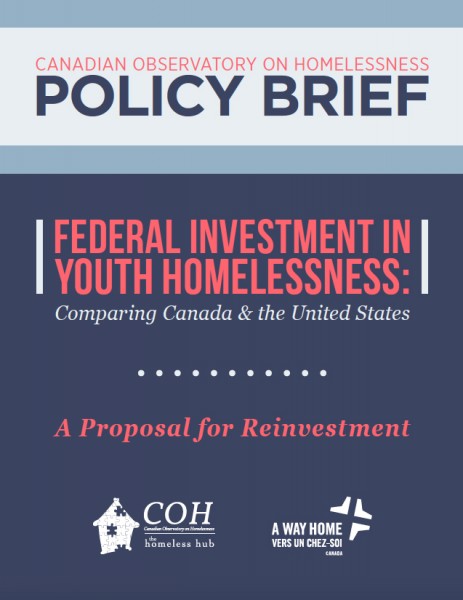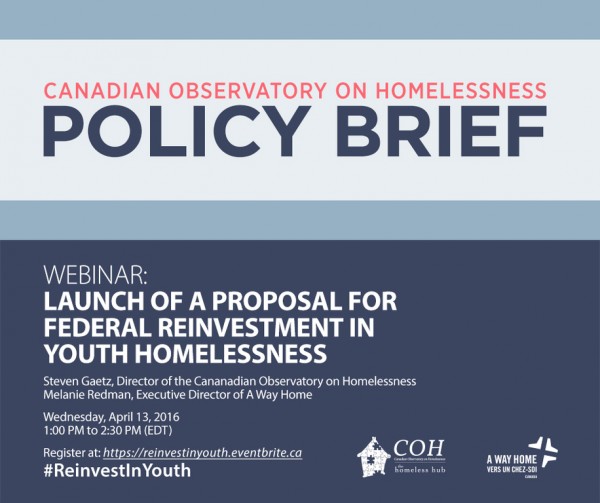TORONTO, April 11, 2016 – In a policy brief released today, the Canadian Observatory on Homelessness at York University, in partnership with A Way Home, is calling on the new federal government to invest $16.5 million annually to support communities to plan and implement strategies to end youth homelessness by 2026.
There are some 35,000 to 40,000 homeless youth in Canada between the ages of 13 and 25, which represent 20 per cent of the entire homeless population. The federal Homelessness Partnering Strategy was renewed in 2014 for five years ($119 million annually) with a focus on Housing First, but there was no targeted funding or strategy for youth homelessness. In the recent Federal budget (2016), the government increased the allocation to the Homelessness Partnering Strategy by over $50 million in each of the next two years, creating an opportunity for a new investment in ending youth homelessness.
 "The causes and conditions of youth homelessness are different than those of adult homelessness and this is important to recognize if we are to help these youth," says York U Professor Stephen Gaetz, director of the Canadian Observatory on Homelessness (Homeless Hub) which released the policy brief, "Federal Investment in Youth Homelessness: Comparing Canada and the United States and a Proposal for Reinvestment."
"The causes and conditions of youth homelessness are different than those of adult homelessness and this is important to recognize if we are to help these youth," says York U Professor Stephen Gaetz, director of the Canadian Observatory on Homelessness (Homeless Hub) which released the policy brief, "Federal Investment in Youth Homelessness: Comparing Canada and the United States and a Proposal for Reinvestment."
While communities are able to use some of their federal funding to address youth homelessness, this for the most part goes to fund emergency services and supports, such as shelters and day programs. "While emergency programs are of course needed, this isn't enough, as it doesn't help prevent or reduce the problem," says Gaetz.
"Few communities have comprehensive plans for dealing with youth homelessness and without strategies communities are only managing the issue, not dealing with the causes or developing ways to eliminate it. Communities need resources to shift direction."
The federal government, which has indicated it is interested in supporting youth and young adults, needs to reinvest not only in communities, but should also engage the provinces and territories in implementing more comprehensive strategies to address youth homelessness. Ontario has signaled that youth homelessness is one of its key priorities and Alberta is the first in Canada to develop and implement a comprehensive youth homelessness strategy.

The investment should focus on community planning, program intervention, including prevention and strategies to help youth exit homelessness, support for Indigenous youth and leadership from the federal government.
"This is important because the federal investment in homelessness in general has declined by $92 millionsince 1999 to $119 million, while the former annual $20 million to target youth homelessness was dropped in 2003," says Gaetz. "In comparison, the US spends C$343 million to address youth homelessness. To match that based on population, Canada would need to spend $37.85 million on youth homelessness."
Negative impacts of homelessness include:
- Increased risk of exploitation, violence, victimization, physical and sexual abuse
- Greater involvement with the police and justice system
- Disengagement from school and difficulty obtaining employment,
- Stress, depression, anxiety disorders and suicide
- Increased use of substances to cope
There is now a real opportunity for the Government of Canada to take the lead and work with community partners to address youth homelessness in a much more strategic and effective manner. With a renewed investment, new opportunities can be created for youth, including housing stability, resiliency, prevention of homelessness, as well as access to education and jobs.
"The time is right for a renewed federal investment on youth homelessness," says Melanie Redman, executive director of A Way Home. "Together with government we can support communities to craft and implement comprehensive strategies to prevent and end youth homelessness. We can also support evidence-based program models and promising practices that focus on preventing young people from becoming homeless in the first place."
As Gaetz says, "There is enough research now that points to the very real possibility of ending youth homelessness."
York University is known for championing new ways of thinking that drive teaching and research excellence. Our 52,000 students receive the education they need to create big ideas that make an impact on the world. Meaningful and sometimes unexpected careers result from cross-discipline programming, innovative course design and diverse experiential learning opportunities. York students and graduates push limits, achieve goals and find solutions to the world's most pressing social challenges, empowered by a strong community that opens minds. York U is an internationally recognized research university – our 11 faculties and 24 research centres have partnerships with 200+ leading universities worldwide.
-30-
Contact Info:
Dr. Stephen Gaetz
Director, Canadian Observatory on Homelessness
Professor, Faculty of Education, York University
416-668-7321
sgaetz@edu.yorku.ca
Melanie Redman
Executive Director, A Way Home
647-502-4114
mredman@awayhome.ca

